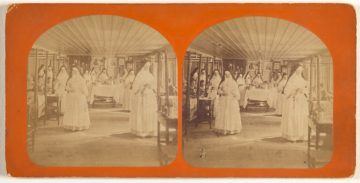Margaret Wardlaw in Guernica:
 Madison was never expected to live this long. The doctors had told her parents she would probably die at birth. Surprising everyone but her mother, she seized and trembled, and refused to suckle—but she didn’t die. Madison never learned to walk. Her four limbs were spastic. She remained small for her age, and she never learned to speak, not even to say Mama or milk, or no. But she saw and experienced many things beyond seizures, infections, breathing and feeding tubes; beyond Christmases and Easters and birthdays, and the everyday intimacies of childhood. She was her mother’s joy, and knew a fierce and indelible love, breathed over her in a nightly vigil. It imbued Madison with the quiet beauty of a survivor. Whatever trials she endured, there was a sense that she was lit from inside by something sacred.
Madison was never expected to live this long. The doctors had told her parents she would probably die at birth. Surprising everyone but her mother, she seized and trembled, and refused to suckle—but she didn’t die. Madison never learned to walk. Her four limbs were spastic. She remained small for her age, and she never learned to speak, not even to say Mama or milk, or no. But she saw and experienced many things beyond seizures, infections, breathing and feeding tubes; beyond Christmases and Easters and birthdays, and the everyday intimacies of childhood. She was her mother’s joy, and knew a fierce and indelible love, breathed over her in a nightly vigil. It imbued Madison with the quiet beauty of a survivor. Whatever trials she endured, there was a sense that she was lit from inside by something sacred.
Still, there were the hospitals. The familiar scene, where doctors told Madison’s mother that her daughter would not survive, played out over and over as the little girl got older. She would get sick—her pulse quickening, fever rising, skin becoming clammy—and then she would get very sick, convulsing with seizures, rapid breath shaking her thin frame. But then, just when she was so sick that everyone thought it would be the final sickness, she would get just a little better. Each time this happened, Madison’s mother, living in ambiguity since her daughter’s birth, would trust the doctors a little less. By the time she got to the hospital where I was a doctor, Madison was almost eighteen. This time she really was dying. Sent to our regional referral center by her well-meaning rural physicians who thought they had nothing left to offer, Madison was barely responsive. The sliding-glass door of her hospital room framed a scene that was, at first glance, distinctly modern. State-of-the-art monitors spewed data, and machines pumped tube feeds and broad-spectrum antibiotics into her body. But Madison’s mother, keeping watch by the bed, her face bent over the curled body of her daughter, was a timeless image of suffering, like a stoic pieta. Except that she bore no trace of the placid, limpid resignation the Holy Mother always seemed to wear. She was unbelieving, and angry.
Your daughter is dying, the doctors at our hospital told Madison’s mother. Doctors always say that, she responded.
More here.
